What The Floods(!) celebrates Waterbury’s flood recovery and resilience
February 23, 2024 | By Lucia McCallum | Community News Service Feb. 27 update: Photos added by CNS photographer Catherine Morrissey. And comments by Eric Gross about his FEMA applications were revised from the original post.
Over plates of locally made appetizers and the rock tunes of a band on a small stage in the Waterbury American Legion, about 75 community members greeted each other on a recent Saturday night to recount stories of mucking out flooded basements and tossing out damaged furniture.

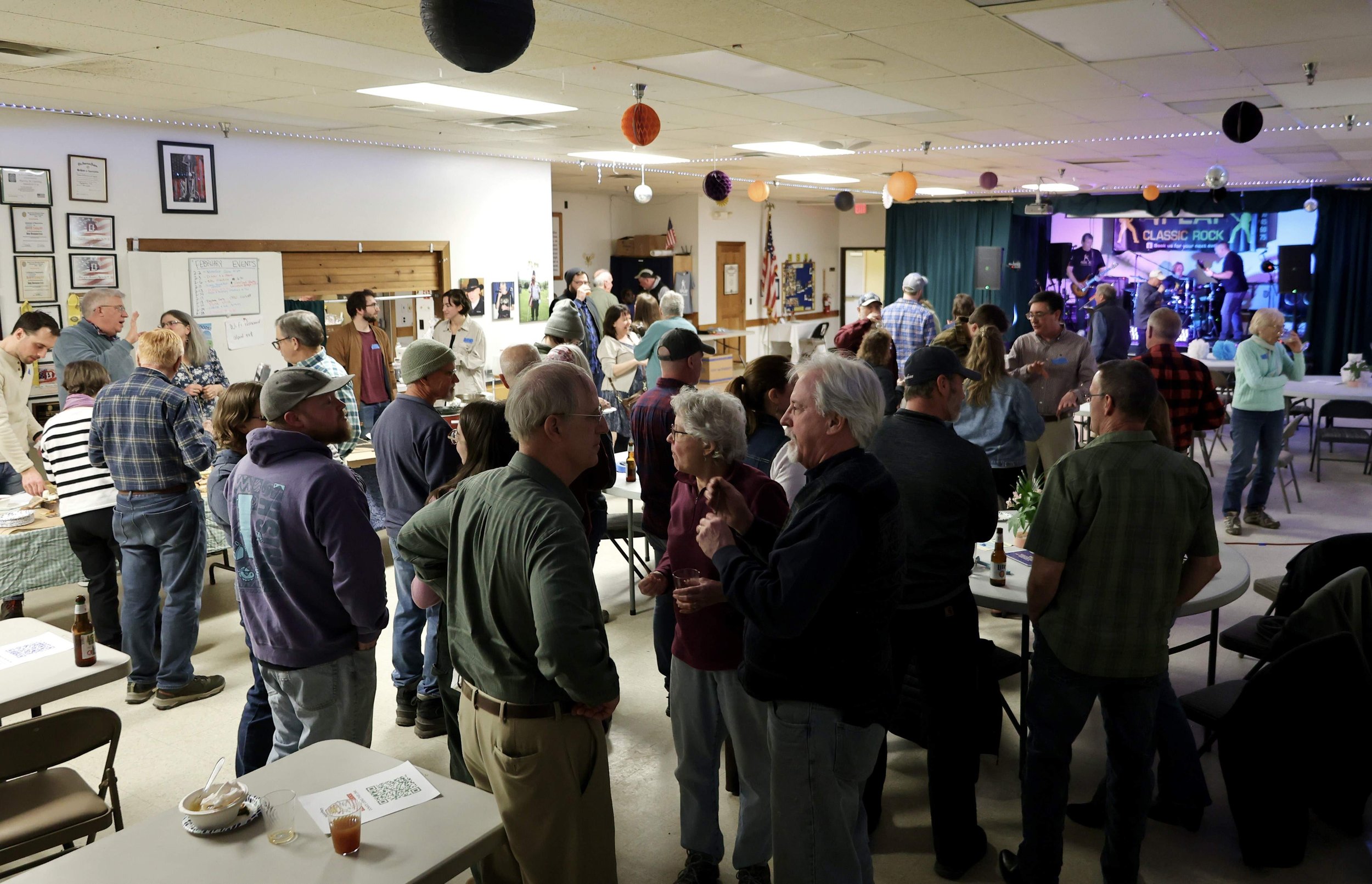
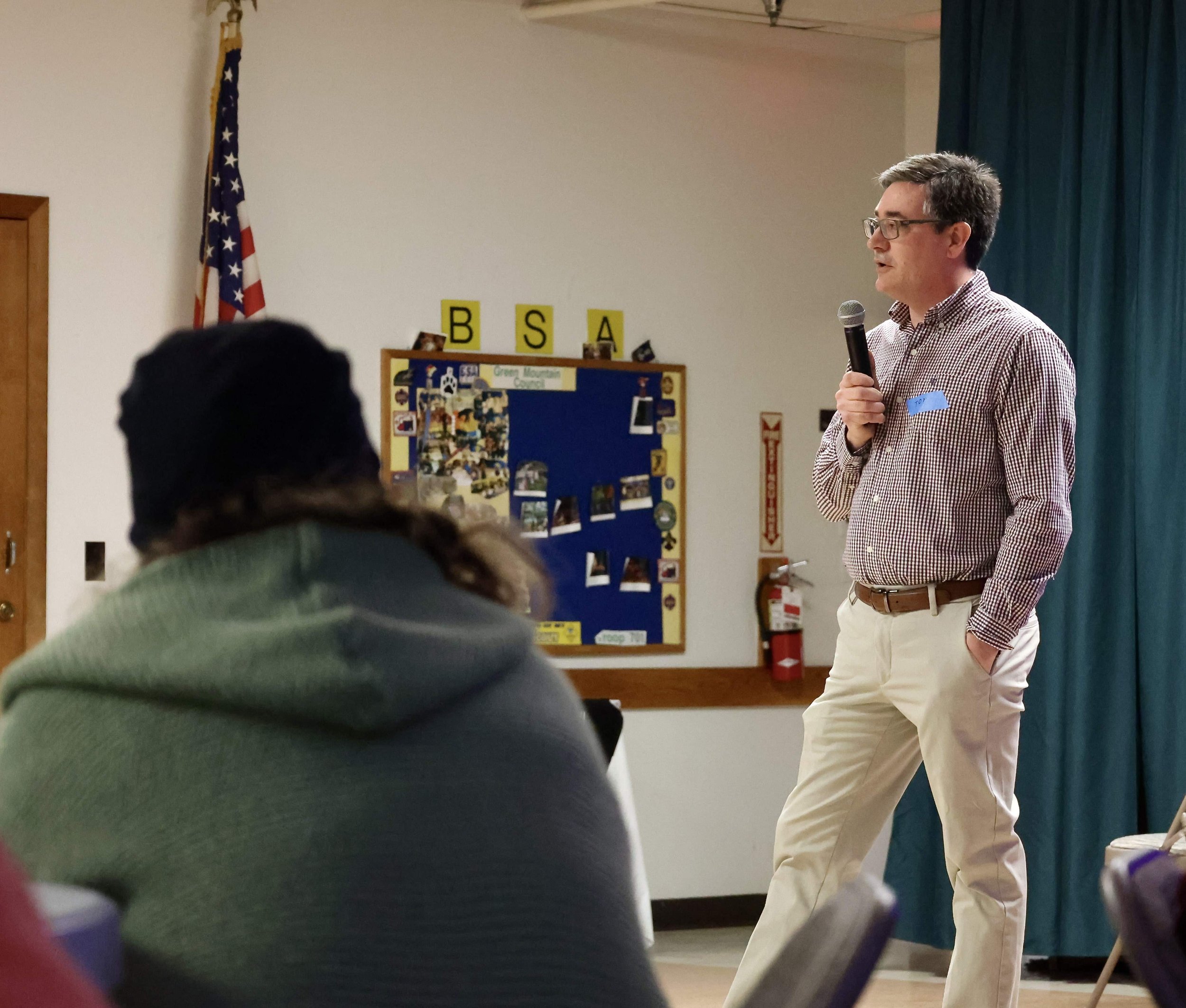
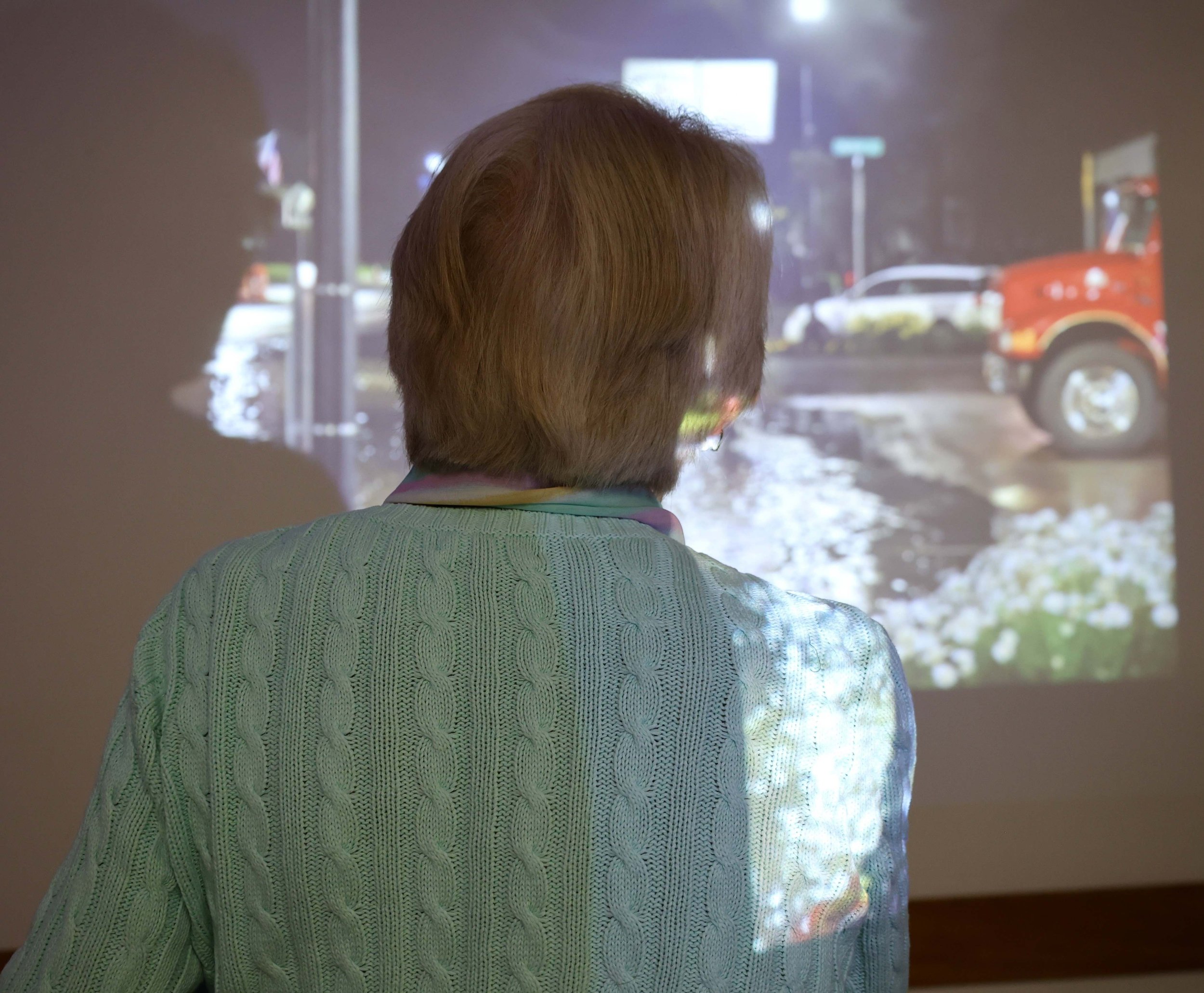
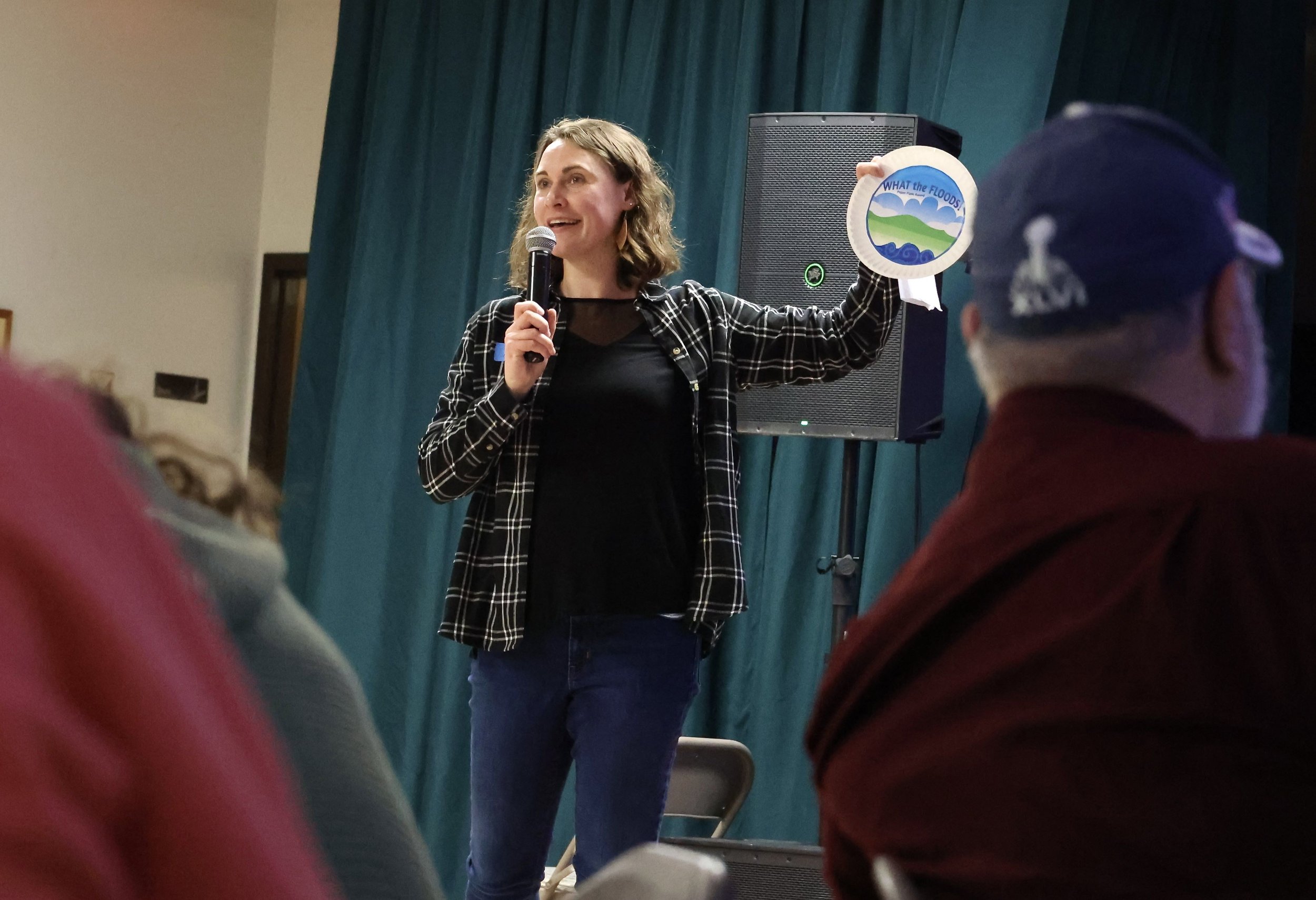


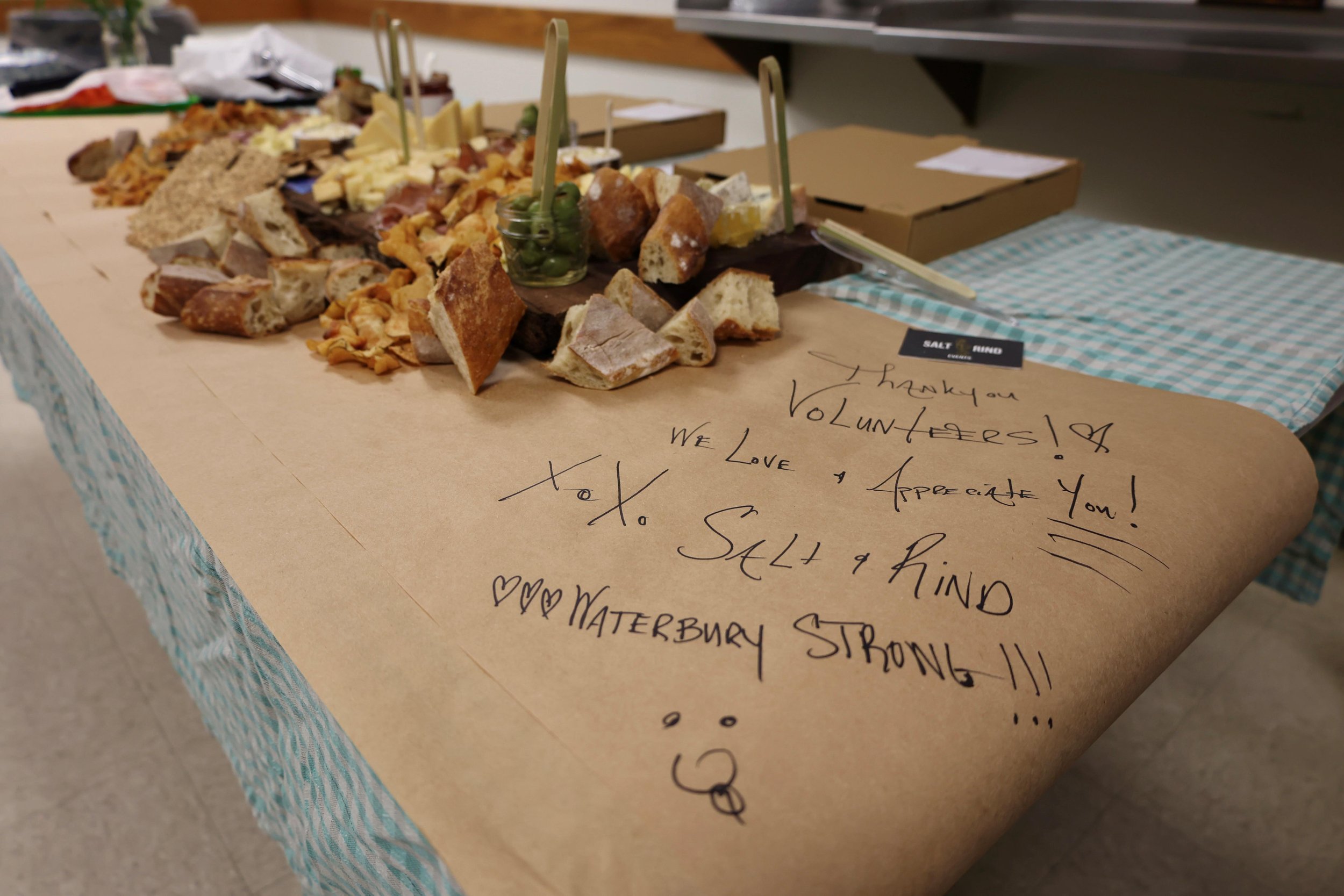

The back right wall of the room filled up with paper plates covered in handwritten messages of gratitude: We heart vactors,” one read, referring to the equipment used to pump out muck from basements. Another touted “Nora Miller: The Good Neighbor Award,” and a third recalled a refrain by Augie Stevens: “Yep, I can do that.”
It was the What The Floods(!) Neighborhood Gathering and Volunteer Appreciation event, sponsored by the town of Waterbury and the Waterbury Rotary Club, with the help of individual donors. WTF aimed to celebrate the groundswell of community assistance for residents and business owners who sustained flood damage during the disastrous July rainstorms that swept Vermont, causing the Winooski River and the Thatcher Brook to breach their banks in Waterbury and flow into the town. The event was originally planned for January but — ironically — was delayed by more flooding from excessive rain and snowmelt in December.
Elm Street resident Cathy Flanders reads the various Paper Plate Awards. Photo by Catherine Morrissey
The gathering encouraged the community to reconnect and rejoice in the wake of a disaster that damaged 170 to 200 properties in July and another 50 to 75 in December, said Liz Schlegel, a Waterbury justice of the peace and vice chair of the Community Resilience for the Waterbury Area, or CReW, which helped organize What The Floods. The long-term flood recovery committee supports residents and businesses impacted by flooding in Waterbury and the neighboring towns of Duxbury, Bolton, Moretown and Middlesex by connecting them with technical assistance and financial resources.
“Having a celebration is really important to be able to show people that their work really matters,” Schlegel said of the many town volunteers who stepped up to help their neighbors.
Several event attendees attested to the benefit of that support.
Eric Gross lives in a Union Street duplex that suffered water damage in July and again in December. “I couldn’t imagine a better place to get flooded twice,” Gross said, pointing to a slideshow projected on a wall during What The Floods.
Some of the photos showed him and other volunteers working in waist-deep gunk. “That’s my neighbor’s house,” he said.
Eric Gross works on mucking out his basement on lower Union Street after the December flood. Photo by Gordon Miller
Gross, who works in construction, estimated that he lost as much as $15,000 in property and equipment in the floods and has struggled to recover financially. He has applied seven times for aid from the Federal Emergency Management Agency. He said he does not think his property would be eligible for a buyout.
The community response made a huge difference for those whose properties flooded, Gross said. He mentioned Tom Drake, the former principal of Crossett Brook Middle School and the town’s recovery coordinator after the July floods, who gathered volunteers and supplies such as dehumidifiers.
All those hard workers convinced Gross to come to the What The Floods event, he said. “It’s a good opportunity to see some of them and show my appreciation.”
Despite the upbeat atmosphere at What The Floods, no attendees said they believe the town’s struggle with flooding is over. Tropical Storm Irene, the 2011 flood that decimated Waterbury, came up frequently in conversation.
Flooding at the roundabout and North Main Street on Dec. 18. Photo by Gordon Miller
Nora Miller, secretary of CReW and the “good neighbor” identified on the paper plate, said the What The Floods event also aims to keep locals vigilant. One of CReW’s core goals is to build local resilience, helping people prepare for future flooding and adapt their homes in ways that make them less susceptible to rising water.
“Like (with) any natural disaster, you stop knowing what it felt like,” Miller said.
Lucy Ely Pagan outside her Randall Street home after the July flood. Photo by Lisa Scagliotti
For Lucy Ely Pagan, who lives on Randall Street, the cleanup process is ongoing. The basement in her and her husband’s home was completely submerged. They lost their hot water heater, boiler, electric heater and many small kitchen appliances. They had just refurbished their boiler a few days before the water level rose again around their house in the December floods.
That time, they managed to bring the equipment upstairs before it was submerged. But it was scary to face another flood while still trying to recover from the last one, Pagan said.
Observers might think, “Well, people have lights on, so they must be okay,” Pagan said. “What they don’t realize is that we still have things to do. Our neighbors still have things to do.”
CReW has scheduled a planning and recovery fair for March 16 to provide information and resources for moving forward. The community still needs to adapt and figure out how to live with the realities of climate change, Schlegel said.
What the Floods(!) event organizers (left to right): Waterbury Recreation Director Katarina Lisaius, volunteer coordinator Liz Schlegel, Select Board member Alyssa Johnson, and Waterbury Rotary Club President Ariel Mondlak. Photo by Catherine Morrissey
“Recovery from disasters takes a long time,” she said. “It takes figuring out how to keep people engaged, engaged in continuing to ask for help or engaged in giving help.”
During her speech to the What The Floods crowd, Schlegel nonetheless gave a hopeful message: “We’re gonna get good at being friends with the river.”
The Community News Service is a program in which University of Vermont students work with professional editors to provide content for local news outlets at no cost.



